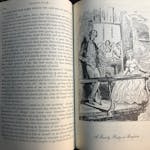As a producer for Baltimore's public radio station, Lawrence Lanahan inevitably waded into the societal divides of race and class. But even after producing a 50-episode series on the topic, Lanahan seemed to feel he was skipping stones. He wanted to dive in, and dive deep.
The result is his sobering book, "The Lines Between Us." With Ferguson, Mo., fresh in the news — and Freddie Gray soon to be — Lanahan used his own backyard of Baltimore as a "petri dish" to explore the shackles of racism that bind the noble idea of an equal society.
This is not a summer beach read. In page after page, Lanahan navigates a maze of politics, bureaucracy and frustration. The details of his reporting can be mind-numbing — a litany of places and names, a weave of past news reports and fresh interviews, a morass of agendas and budgets and minutes of countless meetings held by countless government jurisdictions (many of them contradicting or overriding one another's decisions) — and a careful study of housing policies that, throughout history, have denied black Baltimoreans a chance to move out of blighted neighborhoods.
Again and again, Lanahan shows how the denial of safe, decent housing adds up to the denial of hope. He builds his case so methodically that it can't be dismissed.
His thorough reporting disrobes hypocrisy and leaves decades of political excuses flailing. One excuse, simplified here: Poor blacks self-segregate, and live where and how they live because they choose to. Another: There's no point in helping people move to better (translation: whiter) neighborhoods because there are not many better (translation: whiter) neighborhoods left in the city.
To guide us through this thicket, Lanahan follows three primary and compelling journeys: A young black mother faces a series of setbacks until she gains a voucher to move to utopian Columbia, Md.; an evangelical white couple leave the comfort of the suburbs to follow their faith into the heart of black Baltimore; and an activist lawyer refuses to cave to bureaucratic blockades as she fights for fair, colorblind housing.
Look to be educated and enlightened about the realities that define the shape of America's cities. But don't look for happy endings. Lanahan admits that his deep dive led him into even darker waters than he expected. His reporting is evenhanded, his writing clear-eyed and dispassionate. But by book's end, in a crucial afterword, Lanahan reveals an anger that edges on despair, and makes a clear call for something better from America.
If Freddie Gray became forever linked with the national scourge of police shootings, Baltimore has become shorthand for the intransigence of racial segregation and poverty in urban America. And while Lanahan focuses acutely on Baltimore's decaying neighborhoods, the same divide paves cities across the country.
"The Lines Between Us" serves as a road map for other reporting, and perhaps offers glimpses of potholes to avoid going forward.
Jacqui Banaszynski is a Pulitzer Prize-winning reporter and emerita professor at the University of Missouri School of Journalism. She teaches at the Poynter Institute and coaches writers worldwide.
The Lines Between Us
By: Lawrence Lanahan.
Publisher: The New Press, 395 pages, $28.99.





